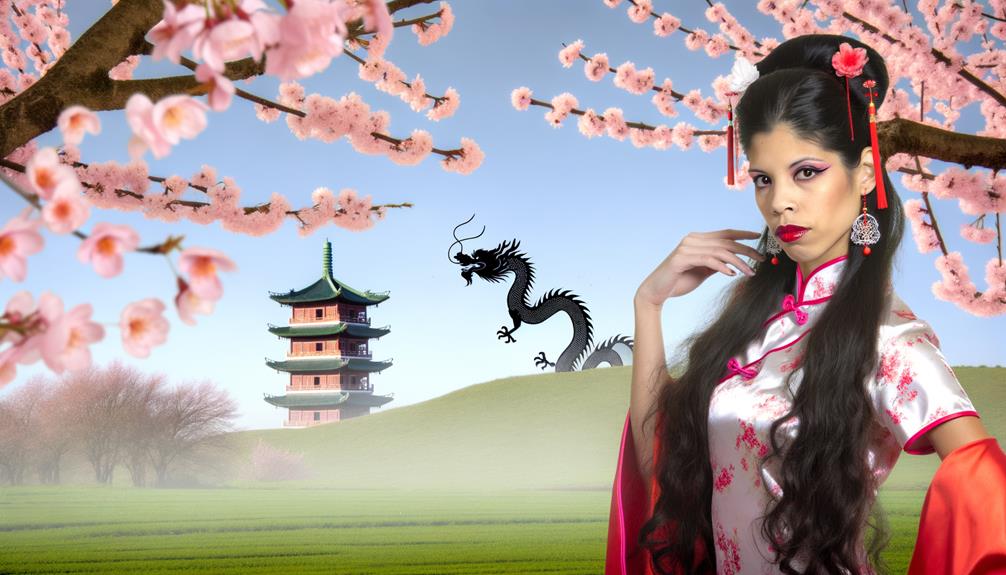Meaning of the Name Mulan
The name 'Mulan' originates from Chinese folklore, particularly the tale of Hua Mulan from the Northern Wei Dynasty. 'Mulan' translates to 'magnolia,' symbolizing purity and strength.
Hua Mulan's story, captured in the "Ballad of Mulan," embodies ideals of bravery, filial piety, and the defiance of traditional gender roles. As a cultural icon, Mulan signifies resilience, personal sacrifice, and loyalty to family, transcending time and cultural boundaries.
This narrative highlights the depth and significance of Mulan in both historical and modern contexts, inviting further exploration of her enduring impact on cultural and global discourses.

Key Takeaways
- 'Mulan' translates to 'magnolia' in Chinese, symbolizing purity and strength.
- The name 'Mulan' embodies themes of bravery, filial piety, and heroism.
- 'Mulan' represents breaking traditional gender roles in Chinese folklore.
- Mulan's name signifies a blend of natural beauty and heroic virtue.
- The name 'Mulan' carries historical and cultural significance in Chinese heritage.
Historical Background
The name Mulan, deeply rooted in Chinese folklore, traces back to the legendary figure Hua Mulan, whose story has been recounted for centuries in various historical texts and cultural narratives.
Emerging during the Northern Wei Dynasty (386–534 AD), Hua Mulan's tale is first documented in the 'Ballad of Mulan,' a folk song that highlights her bravery and filial piety.
Historically, Mulan symbolizes the valor and sacrifice that transcends gender roles, embodying cultural ideals of loyalty and family honor.
This narrative, set against a backdrop of frequent invasions and wars, illustrates the critical role of women in a patriarchal society, thereby cementing Mulan's name as an enduring symbol of resilience and virtue in Chinese cultural memory.
Folklore Roots
The folklore roots of the name Mulan trace back to an ancient Chinese legend, famously captured in the 'Ballad of Mulan.'
This ballad, dating from the Northern Wei Dynasty, narrates the story of a young woman who disguises herself as a man to take her father's place in the army.
The tale embodies cultural values of filial piety, bravery, and honor, which have cemented Mulan as an enduring symbol in Chinese heritage.
Ancient Chinese Legend
Rooted in ancient Chinese folklore, the legend of Mulan originates from the Ballad of Mulan, a narrative poem that dates back to the Northern Wei Dynasty (386–534 AD). This legend encapsulates the historical and cultural essence of filial piety, honor, and bravery. Mulan, a young woman who disguises herself as a man to take her father's place in the army, embodies the virtues admired in traditional Chinese society. The tale's enduring relevance highlights its significance in understanding gender roles and societal expectations of the time. Below is a table providing deeper insights:
| Aspect | Description | Cultural Significance |
|---|---|---|
| Filial Piety | Mulan's primary motivation | Emphasizes family loyalty |
| Disguise & Identity | Mulan's male disguise | Challenges traditional gender roles |
| Heroism | Mulan's bravery and tactical prowess | Celebrates individual valor and honor |
Ballad of Mulan
Originating from ancient Chinese literature, the Ballad of Mulan serves as a foundational text that encapsulates the cultural and historical roots of the legendary heroine's tale. Likely composed during the Northern Wei dynasty (386–534 AD), this narrative poem tells the story of a young woman who disguises herself as a man to take her ailing father's place in the army.
The ballad's themes of filial piety, loyalty, and bravery resonate deeply within Chinese cultural values. Over centuries, Mulan's story has evolved, reflecting societal changes and continuing to inspire. Its enduring relevance underscores the importance of gender roles and family duty in Chinese society, making Mulan a timeless symbol of courage and selflessness.
Etymology
The name 'Mulan' finds its origins in the Chinese language, where it translates to 'magnolia,' a flower symbolizing purity and strength.
Historically, the name has been embedded in Chinese folklore, epitomizing the cultural ideals of filial piety and bravery.
Its etymological roots not only shed light on the linguistic heritage but also highlight the enduring cultural significance of the name throughout Chinese history.
Origins and Roots
In exploring the etymology of the name 'Mulan,' one finds its roots deeply embedded in Chinese culture and language, where it literally translates to 'magnolia flower.' The name carries significant historical and cultural connotations, reflecting the following aspects:
- Linguistic Roots:
Mulan (木兰) combines the characters for 'wood' (木) and 'orchid' (兰), symbolizing elegance and endurance.
- Historical Usage:
The name dates back to ancient Chinese texts, especially the Ballad of Mulan, an epic poem recounting a legendary female warrior.
- Botanical Symbolism:
The magnolia flower is often associated with beauty, strength, and purity in Chinese culture.
- Literary Influence:
The character of Mulan has been a subject of various adaptations, impacting Chinese literature and folklore for centuries.
This multifaceted name encapsulates a blend of natural beauty and heroic virtue.
Cultural Significance
Embedded within the name 'Mulan' is a rich tapestry of cultural narratives that underscore its enduring significance in Chinese heritage.
The name 'Mulan' (木兰) translates to 'magnolia,' a flower that symbolizes purity, resilience, and femininity in Chinese culture. This etymological connection reflects the character's intrinsic virtues.
In folklore, Mulan's story is emblematic of filial piety and national loyalty, values deeply rooted in Confucian principles. The magnolia flower's ability to bloom in harsh conditions parallels Mulan's strength and perseverance.
Therefore, the name 'Mulan' is not merely an identifier but a cultural emblem encapsulating ideals of honor, bravery, and the harmonious blend of strength and grace, which resonate profoundly within the Chinese cultural consciousness.
Historical Context
Tracing the historical roots of the name 'Mulan' reveals a profound etymological journey that intertwines with China's rich literary and cultural heritage.
The name 'Mulan' (木蘭) can be broken down into two characters, each carrying distinct meanings and cultural connotations:
- 木 (Mù) – Translates to 'wood' or 'tree', symbolizing strength and resilience.
- 蘭 (Lán) – Refers to the magnolia flower, representing purity, nobility, and feminine grace.
The name is famously associated with the legendary figure Hua Mulan, immortalized in the ancient Ballad of Mulan.
Historical texts suggest that the name may have been chosen to reflect her dual qualities of strength and elegance, making it a powerful symbol of Chinese womanhood.
Symbolism
The name 'Mulan' holds profound cultural significance, symbolizing bravery, filial piety, and the breaking of traditional gender roles within Chinese history and folklore.
Rooted in the legendary tale of Hua Mulan, who disguised herself as a man to take her ailing father's place in the army, the name epitomizes courage and devotion to family.
Mulan's narrative challenges the rigid gender norms of ancient China, where women were traditionally confined to domestic roles. Her story serves as a powerful symbol of gender equality and personal sacrifice, resonating deeply within Chinese cultural consciousness.
Cultural Impact
Throughout history, Mulan's tale has profoundly influenced both Chinese culture and global perceptions of gender roles and heroism. Rooted in a narrative of bravery and defiance, Mulan challenges traditional gender norms, inspiring countless adaptations and reinterpretations. The cultural impact of Mulan can be analyzed through several dimensions:
- Historical Context: Originating from the Northern and Southern Dynasties period, Mulan's story reflects the era's social and military dynamics.
- Gender Roles: Mulan's cross-dressing to save her father subverts entrenched gender expectations.
- Cultural Significance: Mulan embodies values of filial piety, loyalty, and courage, central to Confucian ethics.
- Global Influence: The tale has transcended Chinese borders, influencing international media, including literature, films, and animation, thereby promoting cross-cultural dialogue.
Mulan in Literature
Building upon Mulan's profound cultural impact, her narrative has been extensively explored and reimagined in various literary forms, illustrating the enduring relevance of her story across different historical and cultural contexts.
The earliest known text, the 'Ballad of Mulan,' dates back to the Northern Wei Dynasty (386-534 AD), encapsulating themes of filial piety and patriotism. Over centuries, her tale has been adapted into countless poems, plays, and novels, each iteration reflecting contemporary societal values and concerns.
Mulan's character, a symbol of bravery and virtue, challenges traditional gender roles and resonates with audiences globally. Her story's adaptability underscores its universal appeal, allowing it to traverse cultural boundaries and maintain its significance in literature through time.
Modern Interpretations
In contemporary culture, Mulan's story has been reinterpreted through various media, reflecting modern themes of identity, empowerment, and cultural diversity. These interpretations often highlight Mulan's defiance of traditional gender roles and her journey towards self-actualization.
The following key elements are prominent in modern retellings:
- Feminist Empowerment: Mulan symbolizes women's potential to break societal barriers.
- Cultural Representation: Adaptations emphasize authentic Chinese cultural heritage.
- Identity Exploration: Mulan's struggle with societal expectations resonates with themes of personal identity.
- Heroism and Sacrifice: Her narrative underscores values of bravery and altruism.
This multifaceted portrayal of Mulan enriches her legacy, demonstrating her enduring relevance and adaptability across different cultural contexts.
Global Resonance
Mulan's narrative, with its themes of empowerment and cultural representation, has achieved global resonance, transcending its origins to inspire diverse audiences worldwide.
Historically rooted in the Chinese Ballad of Mulan, the story has evolved through centuries, gaining prominence through literature, theater, and film. Its portrayal of a young woman challenging gender norms and societal expectations strikes a universal chord, making it relevant across various cultural contexts.
The tale's ability to bridge Eastern and Western perspectives underscores its profound cultural significance. By highlighting issues such as gender equality and filial piety, Mulan not only preserves its cultural heritage but also fosters a global dialogue on these timeless themes, demonstrating the enduring power of storytelling in shaping collective human experience.
Conclusion
The name 'Mulan' serves as a cultural tapestry, weaving together historical context, folklore, etymological roots, and rich symbolism. This name transcends its origins, becoming a beacon of resilience and bravery in literature and modern interpretations.
Like a river that carves its path through diverse landscapes, Mulan's legacy shapes and is shaped by cultural narratives across the globe, affirming its timeless resonance and profound impact on collective consciousness.






